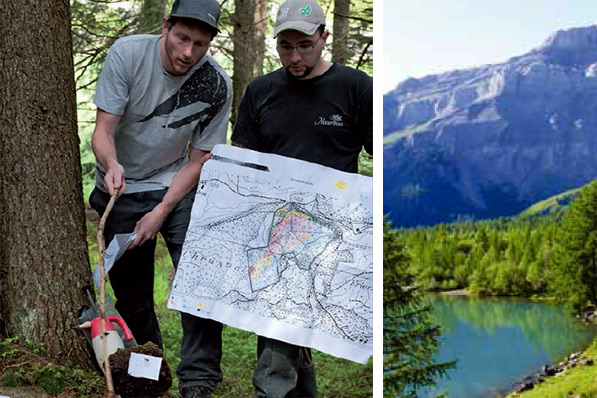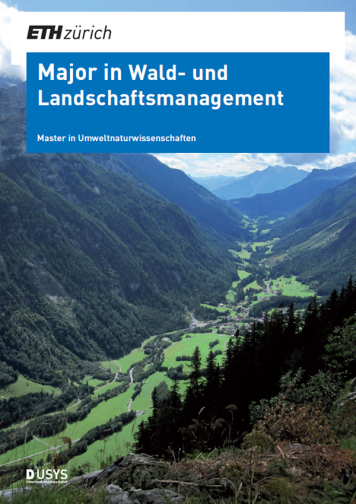Forest and Landscape Management
The major Forest and Landscape Management focuses on forested landscapes and gives detailed insights in forests, looking at ecological, economic, and social aspects as well as their interactions.

Forests are a major topic, but the landscape context in which they are situated plays an important role too. Landscapes with their underlying socio-economic systems are covered within the major in Forest and Landscape Management. Aspects such as their historic development, factors that shape landscapes, the services they provide and the ways how the ecological, economic, social, and aesthetical quality can be managed are discussed within the curriculum.
The major further provides knowledge and skills on how to manage these long-living ecosystems safeguarding their resilience and resistance to upcoming challenges, such as climate or demographic change.
Natural Science Foundations
Students acquire a multi-faceted understanding of forests and landscapes. Topics encompass natural assets and processes inherent in these systems, their interactions and the ecosystem services provided.
Ecosystem Management
Students acquire the skills to integrate systems knowledge so as to develop forest and landscape management schemes that are biophysically feasible, economically efficient, ecologically justifiable and institutionally acceptable.
Decision Making, Policy and Planning
Students acquire the skills needed to analyse, evaluate and support collective decision-making processes. Students can develop and adapt governance processes and instruments for the implementation of natural resource-related programs and projects.
Methods and Tools
Students enhance their methodological know-how for sampling, processing and analyzing spatio-temporal data of small to large-scale systems. They increase their data management, modelling and analytical skills (e.g., GIS, Data Science).
Project-related Work
Students work in teams on a real-world problem in close collaboration with stakeholders. The course provides a set of complex forest- and landscape-related problems that require development of appropriate problem-solving approaches. In this capstone course, students integrate knowledge from different domains covered during the BSc and MSc curriculum.
Interests/ Prerequisites
- Botanical knowledge
- Forest and landscape ecology
- GIS and spatial statistics
- Land use and land planning
- Environmental policy, governance and law
Education and Learning objectives
- The education is provided by the Institute of Terrestrial Ecosystems
- Have core knowledge on forest/terrestrial ecosystem functioning in its socio-economic context
- Have in-depth knowledge of sustainable forest production systems in the landscape context, including the interactions among the subsystems making up the landscape
- Be conversant in interdisciplinary aspects of ecosystem management under changing human and environmental driving forces (e.g., climate change, land use change)
- Be able to analyze, assess and design ecosystem management schemes with a particular emphasis on their sustainability and their ability to efficiently deliver the range of ecosystem goods and services requested by human societies
Possible careers
- GIS specialist in the cantonal forest authorities
- Natural hazard expert in an insurance company
- Project leader in a nature conservation NGO
- Spatial planner in a private planning office
- Further details about this major can be found in the Download Environmental Sciences Study Guide (PDF, 892 KB)
- external page Information about the forestry internship for graduates by the Federal Office for the Environment (in German)
Contact
Head of Institute of Terrestrial Ecosystems
Management Forstlicher Ressourcen
Universitätstrasse 16
8092
Zürich
Switzerland
